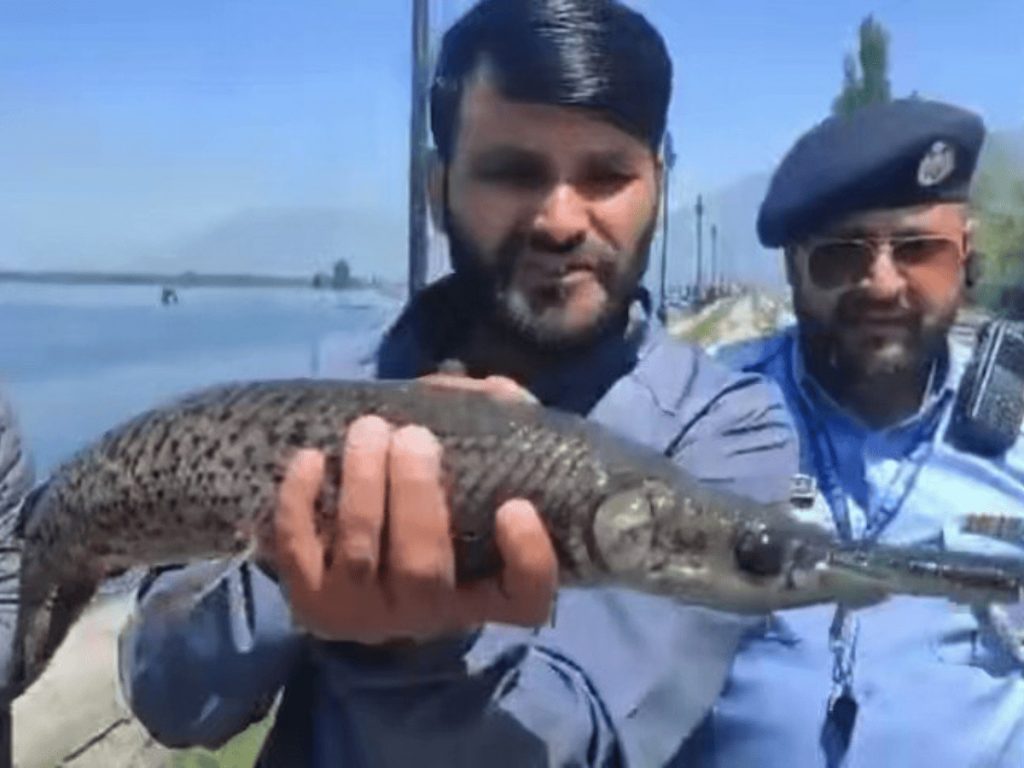
The Alligator Gar fish, characterized by its crocodile-like head and formidable razor-sharp teeth, has raised concerns among experts who fear it could become an invasive species and disrupt the delicate balance of the natural aquatic ecosystem in Dal Lake. A report by Riaz Wani
An Alligator Gar fish was recently discovered in Dal Lake, sparking worries about the potential threat it may pose to the native fish species in the region. This is the first recorded instance of this rare species, native to North America, being found in Kashmir. It can also be found in parts of Bhopal and Kerala.
The Alligator Gar fish, characterized by its crocodile-like head and formidable razor-sharp teeth, has raised concerns among experts who fear it could become an invasive species and disrupt the delicate balance of the natural aquatic ecosystem in Dal Lake. While some experts have suggested that the fish may not be harmful, experts have cautioned about the potential risks it poses to the local fish varieties in the Kashmir valley.
The Jammu and Kashmir Lake Conservation and Management Authority in collaboration with the fisheries department, is currently working to analyze the situation and investigate how the Alligator Gar fish made its way into the lake.
“This is an Alligator Gar fish which is normally found in North America and some parts of India like Bhopal’s upper lake and Kerala’s backwaters,” Dr. Shafeeqa Peer, a scientist at the LCMA, told media. “Being a predator fish and a carnivore, it poses a threat to native species of Dal Lake.”
Peer added, “What will be the fate of our native fishes? In certain places like Bhopal, it has been banned as it thrives on other small fishes. It poses a threat to other species and we have not yet come across this type of species here.”
This discovery follows previous incidents in 2016 when a Grass Carp fish was found in Dal Lake, and another in Manasbal Lake, further emphasizing the need for thorough research to protect the local aquatic life and preserve the ecosystem of Dal Lake.
Already, the introduction of carp varieties and trout in the water bodies is blamed for the decline in the production of the native Schizothorax fish species. Some of its species have become extinct now over the past some decades. Biologist Jakob Heckel during his visit to Kashmir in 1838 had reported the presence of 16 fish species in his book ‘Fische Aus Caschmir’, 12 of them those of Schizothorax. Now only five species can be found.
The carnivorous nature of trout has led to the consumption of Schizothorax eggs and fingerlings, while carp have encroached upon the breeding grounds of the local fish. The rising pollution levels, encroachment, and water diversion have further exacerbated the destruction of Schizothorax breeding grounds.
The decline of Schizothorax disrupted the local fisheries ecosystem. Now the discovery of Alligator Gar fish is apprehended to attack the ecosystem of carp species and pose an additional threat to the existing fish species in Kashmir’s water bodies.
Executive Engineer LCMA, Masood Ahmad Khan said that Alligator Gar feeds on larval fishes and insects, adding that adult fish will eat whatever they can catch, consuming primarily fish, but occasionally taking birds, mammals, and other animals.
Alligator gar can ambush a predator and then attack with its large jaws,” Khan said. The Gar’s good vision and ability to sense chemicals seem to be the main means by which they detect prey in the water.”
Environmental scientist M.R.D. Kundangar has also raised concerns over the finding, and warned of potential disastrous consequences. He highlighted the carnivorous nature of the Alligator Gar, stressing that its predatory behavior could lead to the decimation of other fish species inhabiting the water body.
“It will destroy other animal fauna of the lake and will be dangerous for the swimmers,” Kundangar said. “Alligator gar has already become a nuisance in Telangana and Andhra Pradesh and reports of the fish breeding fast and becoming invasive in water bodies of Tamil Nadu are also pouring in.













